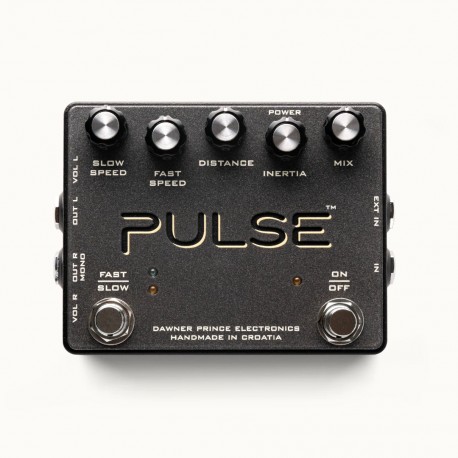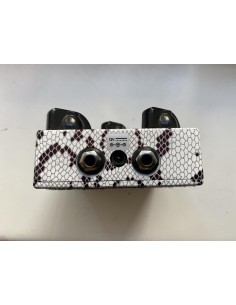Revolving speaker cabinet is one of the highest revered musical devices, but recreating it soundwise in the pedal form is quite a challenge. We spent countless hours on R&D, measuring every detail on a real physical model and using advanced math to emulate its complex sound image along with all the physics and mechanics behind it. And it’s all in there - a realistic three-dimensional sound that swirls as the speaker accelerates, exact spatial modulation and the feel of the air moving with every spin.
Features
Slow Speed
Controls the speed of the speaker rotation when the unit is in SLOW mode. Minimum setting yields the slowest speed of 0.4 revolutions per second and maximum setting yields the fastest speed of 4 revolutions per second.
Fast Speed
Controls the speed of the speaker rotation when the unit is in FAST mode. Minimum setting yields the slowest speed of 4 revolutions per second and maximum setting yields the fastest speed of 8 revolutions per second.
Distance
Distance is an accurate virtual microphone placement control. It sets the distance between virtual microphones and the revolving speaker cabinet. Minimum setting is the furthest distance and maximum setting is the closest distance.
Inertia
Controls the amount of time it takes for the speaker to accelerate from SLOW to FAST and to decelerate from FAST to SLOW mode.
Mix
Controls the amount of dry input signal from the FET preamp in the output mixer. Minimum setting is 100% dry, maximum setting is 100% wet. 12:00 position yields 50% - 50% wet-dry mix.
True Bypass switching system with status LED
Switches the effect ON and OFF. When in ON mode, status LED will glow yellow.
Fast/Slow switching system with status LEDs
Switches between SLOW and FAST speaker rotation. Yellow LED indicates SLOW mode and blue LED indicates FAST mode.
TRS Stereo Input
accepts either mono or TRS stereo signals selectable via internal jumper. However, for the rotary effect only the TIP IN (right) is used. In bypass mode both TIP (right) and RING (left) inputs are routed to the corresponding outputs in stereo. The pedal ships preset in mono mode.
Output R MONO/Output L
PULSE provides a stereo output by two virtual microphones placed on each side of the speaker cabinet. Using solely OUT R - MONO output engages a single virtual microphone in front of the speaker cabinet.
External Input
Accepts expression pedal or remote switch connection for external speed control. To use an expression pedal, plug it in, set it to minimum (HEEL) position and adjust SLOW SPEED potentiometer to desired value. Now set the pedal to its maximum (TOE) position and adjust FAST SPEED potentiometer to desired value. Finally, move the pedal back and forth to hear the results. To use the remote switch, connect SPDT (ON/ON) switch wired TIP - center lug, RING - outer lug, SLEEVE - second outer lug. Onboard SLOW/FAST switch is automatically disengaged when expression pedal or remote switch is connected. For expression pedal we suggest using Roland® EV-5 but it will operate with almost any type of pedal available.
Volume R/Volume L
Control the levels of the output signals on OUT R and OUT L channels. Unity gain is at 12:00 position. When using Pulse in mono out mode, make sure to set both trimmers at the same level to maintain realistic revolving speaker effect.
Tech specs
- Power Input Voltage: 9V DC
- Power input connector: 5.5mm / 2.1mm barrel connector (Center Negative)
- Power Consumption: ~ 70mA
- Size: 4.4” x 2.3”


















